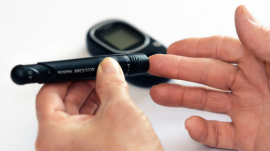
Sleep Apnea and Diabetes
It’s estimated that over 100 million Americans have diabetes in some form (2) while 22 million suffer from sleep apnea, and 80% of cases with severe and moderate OSA undiagnosed. Alone, both of these conditions can lead to an impact in the daily functioning of people, but when combined (which they often are), the health complications get worse and feed into each other.
Obstructive sleep apnea is a condition that is known to repress the immune system (1) and have many comorbidities that are known to cause a shorter lifespan and worsened quality of life, such as hypertension and diabetes.
Facts:
People with severe OSA (an apnea hypopnea index of >30) were found to have a 30% higher risk of developing Type 2 diabetes than people without OSA.
Additionally, those with mild or moderate OSA were found to have a 23% increased risk of developing Type 2 compared to those without OSA.
It’s estimated that up to 83% of patients with type 2 diabetes suffer from unrecognized OSA.
OSA is often undiagnosed, making the risk of developing chronic conditions such as diabetes worse due to compounding, unaddressed health problems.
What’s the connection?
The relationship between the two is a vicious cycle that feeds into itself, with poor quality sleep raising blood sugar levels and that, in turn, cause restlessness at night and additional overeating. When this happens, blood sugar levels can raise to the point where it can do damage to organs such as the eyes (glaucoma), kidneys, and heart (3).
In addition to this, hyperglycemia caused by diabetes can lead to fatigue, which will only make the daytime sleepiness of sleep apnea worse (4).
Type 2 diabetes is not irreversible, and the health benefits from managing the condition are lifelong. As always, the first step in addressing these health issues is talking to your patients about signs of OSA they may be demonstrating from an oral examination and asking about their sleep history.
Sources:
Immunological Consequences of Obstructive Sleep Apnea – Full Text View. (2006, June).
Retrieved December, 2018. Accessed from NIH
CDC Newsroom. (2017, July 18). Retrieved January 03, 2019, from CDC
Muraki, I., Wada, H., & Tanigawa, T. (2018, September). Sleep apnea and type 2 diabetes. Retrieved from NCBI
Pamidi, S., & Tasali, E. (2012, August 13). Obstructive Sleep Apnea and Type 2 Diabetes: Is There a Link? Retrieved January 5, from NCBI

